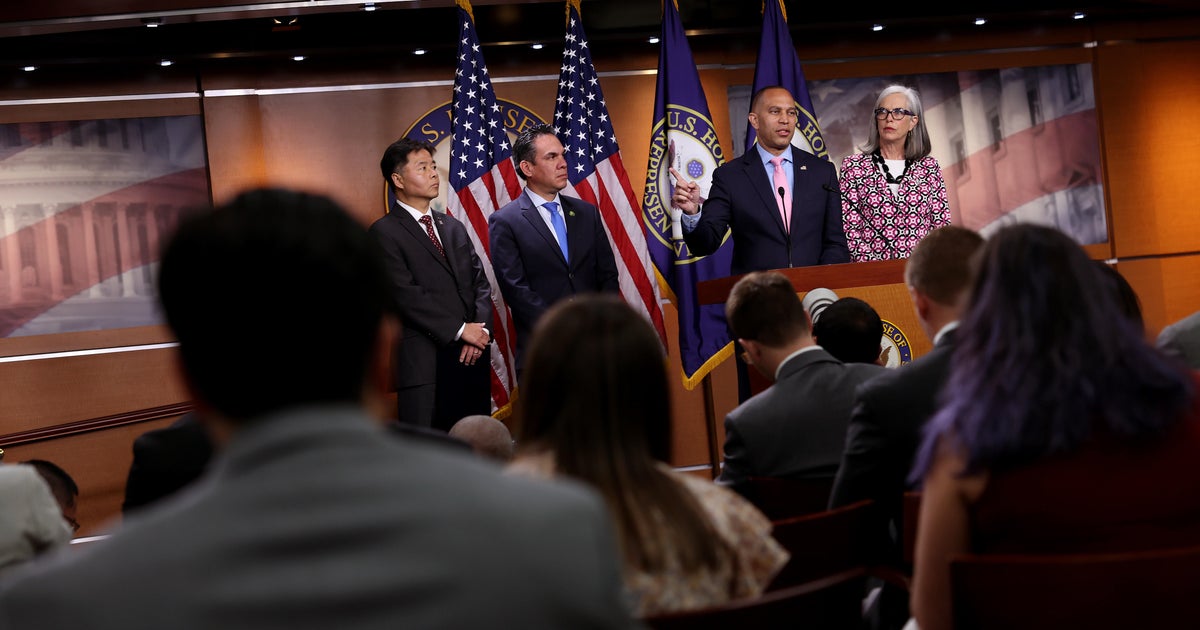Bill that could lead to slavery reparations proposals may be nearing consideration on House floor
After more than three decades, a bill that could lead to slavery reparations proposals appears set for a major step forward. The House Judiciary Committee plans to mark up the bill and vote on it Wednesday.
If the legislation is reported out of committee, it would set up the first floor vote on the measure since its introduction in 1989.
"This is what we call the next step," Representative Sheila Jackson Lee told CBS News. "America has never acknowledged the original sin, and that if you look at African Americans today, the disparities that were entrenched in slavery still exist."
The Texas congresswoman is the lead sponsor of the bill, known as H.R. (House Resolution) 40. It was initially introduced by the late Michigan Representative John Conyers.
The measure would establish a commission to examine the implications of slavery from 1619 to the present and develop reparations proposals for African Americans.
"I think people want healing, they want repair and they understand that reparations is not an injustice, it is just," said Jackson Lee.
The bill was reintroduced at the beginning of this year after the committee held a high-profile hearing on it in 2019, on Juneteenth, the day many celebrate the emancipation of enslaved African Americans. Witnesses included actor Danny Glover, writer Ta-Nehisi Coates and New Jersey Senator Cory Booker.
"As a nation, we have yet to truly acknowledge and grapple with the racism and white supremacy that tainted this country's founding and continues to cause persistent and deep racial disparities and inequality," Booker testified.
He recently re-introduced a resolution for a congressional commission on truth, racial healing and transformation to address systemic racism.
Last month, the Chicago suburb of Evanston, Illinois became the first city in the nation to establish a reparations program. Aimed at redressing past discriminatory housing practices, eligible Black residents can receive up to $25,000 in grants to purchase or repair a home. Reparations initiatives are also being considered in several other cities as well as the state of California.
Rev. Robert Turner of the historic Vernon A.M.E. Church — the only structure to survive the Tulsa Race Massacre — says prayers are being answered as momentum is picking up for reparations.
His church is a plaintiff in the recent lawsuit suing the city of Tulsa and other local government entities for the damages suffered from the Massacre when a white mob destroyed the Greenwood District, once known as "Black Wall Street," on May 31st, 1921.
"Being at the eve of the centennial of the 1921 Race Massacre, we welcome H.R 40," Turner told CBS News. "It can help lend further voice to the needs for justice, and as it will happen for the country, it can also happen for Tulsa."
The House bill has 175 sponsors — more than double the number in 2019. It has never advanced out of committee but is expected to this time since Democrats outnumber Republicans on the panel.
"Seeing this type of movement after so many years of being dormant, it's extremely significant and represents a unique time not only socially but politically," said Driesen Heath, a researcher and racial justice advocate at Human Rights Watch, who testified at a sub-committee hearing on the bill earlier this year.
During that hearing, critics charged reparations were counterproductive and divisive.
"Reparation teaches separation," former NFL player Herschel Walker said in an opening statement. "It will only create division with the different races which I feel continue to tell us we are African-American rather than just an American."
Jackson Lee argues the reparations bill is warranted and hopes it can be voted on by the House by this summer.
While its course could be more difficult in the Senate, the White House has said President Biden supports the study of reparations.
"The timing is great," Jackson Lee told CBS News. "We are now, unfortunately, seemingly going back — massive voter oppression and suppression with legislation across America, the tragedies against black men as it relates to the encounters in law enforcement certainly needs to be repaired and the disparities in wealth is very stark, even today. The time for H.R. 40 is now."
The "40" in H.R.40 refers to 40 acres and a mule, a broken Civil War-era promise that was made by the government to newly freed slaves after emancipation.




